Posts Tagged ‘Matthew Goode’
Fortune Favours the Bold
The King’s Man
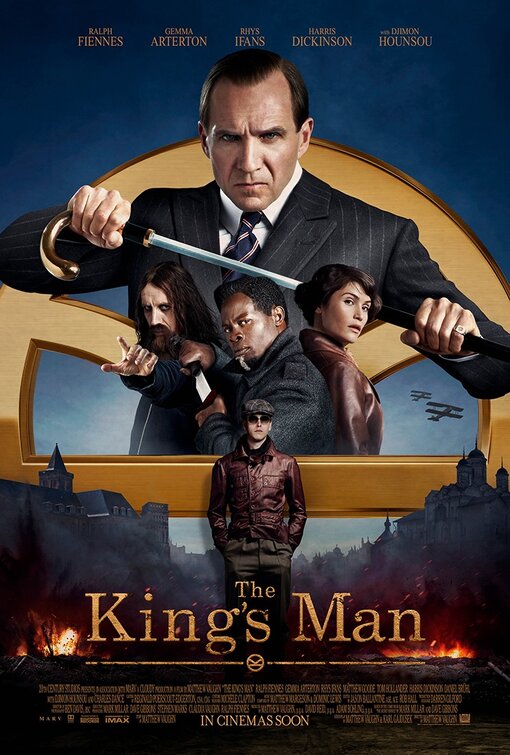
Director: Matthew Vaughn
Cast: Ralph Fiennes, Harris Dickinson, Gemma Arterton, Rhys Ifans, Djimon Hounsou, Matthew Goode, Charles Dance, Daniel Bruhl, August Diehl, Alexandra Maria Lara, Tom Hollander, Alison Steadman, Aaron Taylor-Johnson
Film Rating: 7 out of 10
Running time: 2 hours and 10 minutes

Topping the two previous Kingsman films, this highly anticipated prequel simply titled The King’s Man follows the adventures of Orlando Oxford, or the Duke of Oxford wonderfully played with a nuanced panache by Oscar nominee Ralph Fiennes (Schindler’s List, The English Patient) as we track his valiant attempt to protect his son Conrad Oxford from harm.

The King’s Man fortunately is steeped in historical references and is set between 1902 and 1918. Director Matthew Vaughn places the story between the Anglo-Boer War in South Africa whereby the British were brutally confining Afrikaners in concentration camps to the outbreak of the 1st World War in Europe which was sparked off by the untimely assassination of Archduke Ferdinand in Sarajevo in 1914.

Orlando Oxford is ably assisted by Shola played by Oscar nominee Djimon Hounsou (Blood Diamond, In America) and Polly played by Gemma Arterton (The Quantum of Solace).

As World War I breaks out, the Duke’s son Conrad played by Harris Dickinson who was brilliant as the kidnapped J. Paul Getty III in Danny Boyle’s excellent TV series Trust, is desperate to fight in the front line. The Duke of Oxford in the meantime is trying to find a way of ending World War One, this atrociously bloody conflict as started by 3 first Cousins, all grandchildren of Queen Victoria: King George of Great Britain, Kaiser Wilhelm of Germany and Tsar Nicholas II of Russia all of whom are dexterously played by Tom Hollander (Gosford Park, Pride and Prejudice).

In a particularly bizarre scene at a Russian ball, The Duke of Oxford and his son battle the outrageous Grigori Rasputin expertly played with sinister flamboyance by Rhys Ifans (Notting Hill, Anonymous).
As the action shifts around the world and director Matthew Vaughn efficiently cuts through all the historical cobwebs to reignite the story of The King’s Man with some stylishly entertaining action scenes, it is Ralph Fiennes as the Duke of Oxford who becomes the action hero in a role which he clearly delighted in playing.

Audiences should look out for some great cameo roles, particularly veteran British actor Charles Dance (The Imitation Game, White Mischief) as Kitchener, Matthew Goode (Brideshead Revisited, A Single Man) as Morton and German actor Daniel Bruhl (Rush, Inglorious Basterds) as the shady Erik Jan Hanussen a malignant advisor to Kaiser Wilhelm of Germany.

Historically, The King’s Man is an intriguing action film, thoroughly entertaining and as a prequel it is sophisticated without taking itself too seriously.

If audiences enjoy a dazzling swashbuckler then The King’s Man which gets a film rating of 7 out of 10 and is far better than the other two Kings Men films Kingsman: The Secret Service and the outlandish Kingsman: The Golden Circle.
This time director Matthew Vaughn does this franchise justice and reiterates the motto that Manners Maketh Man.
Manipulated Intelligence
Official Secrets
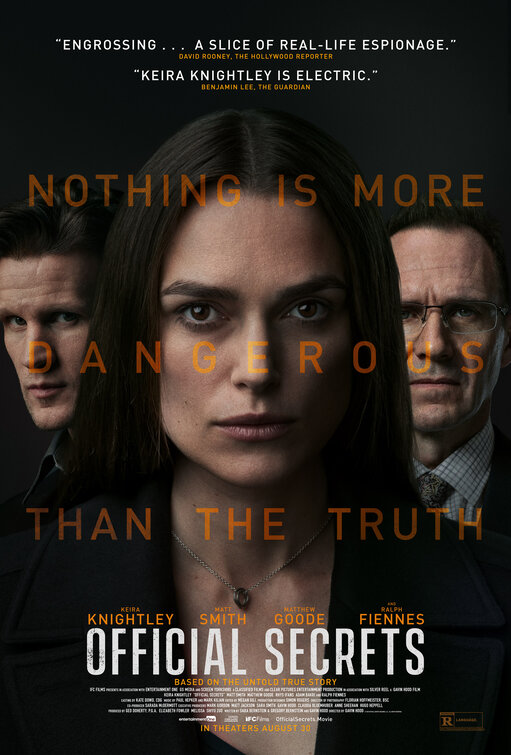
Director: Gavin Hood
Cast: Keira Knighley, Matthew Goode, Matt Smith, Rhys Ifans, Ralph Fiennes, Jeremy Northam, Indira Varma, Tamsin Greig, Jack Farthing, Conleth Hill
Set in London in 2003, South African director Gavin Hood’s British political film Official Secrets revolves around the complex story of Katherine Gunn who broke the Official Secrets Act and leaked highly classified Government information on British and American efforts to sway the vote in the UN in favour of a resolution legitimizing the 2003 invasion of Iraq on the dubious premise that Saddam Hussein was harbouring chemical weapons or weapons of mass destruction.
Oscar nominee Keira Knightley (The Imitation Game) stars as the morally conflicted Katherine Gunn who despite working for a highly classified division of the British Foreign Office and Mi6 deliberately leaked a politically sensitive memo to The Observer newspaper in London whereby political news reporter Martin Bright played by The Crown star Matt Smith.
Oscar nominee Ralph Fiennes (The English Patient, Schindler’s List) reunites with Keira Knightley onscreen after their starring roles in director Saul Dibb’s magnificent costume drama The Duchess as he stars as human rights lawyer Ben Emmerson who decides to take on Gunn’s case in which she could be charged by the Crown prosecution for treason and for being a spy.
Official Secrets was Britain’s entry into the recent European Film Festival https://www.eurofilmfest.co.za/ which had recent screenings in Johannesburg, Cape Town and Pretoria in November before being released on the general circuit in December 2019.
Official Secrets is an engaging political thriller about manipulated intelligence and about the length powerful nations will go to, to legitimatize a foreign invasion even if the premise for such an invasion are both legally and morally flawed.
Featuring an array of British stars including Downton Abbey star Matthew Goode and Rhy Ifans along with Jeremy Northam and Poldark star Jack Farthing, Official Secrets is an engaging if slightly dark political thriller about recent events that led to the 2003 invasion of Iraq and Afghanistan by American and British forces.
Recommended for those that enjoy murky political thrillers, Official Secrets gets a film rating of 7.5 out of 10 and is interesting but not nearly as brilliant as such films as Tinker, Tailor, Soldier, Spy or The Constant Gardener.
The Downstairs Revolt
Downton Abbey
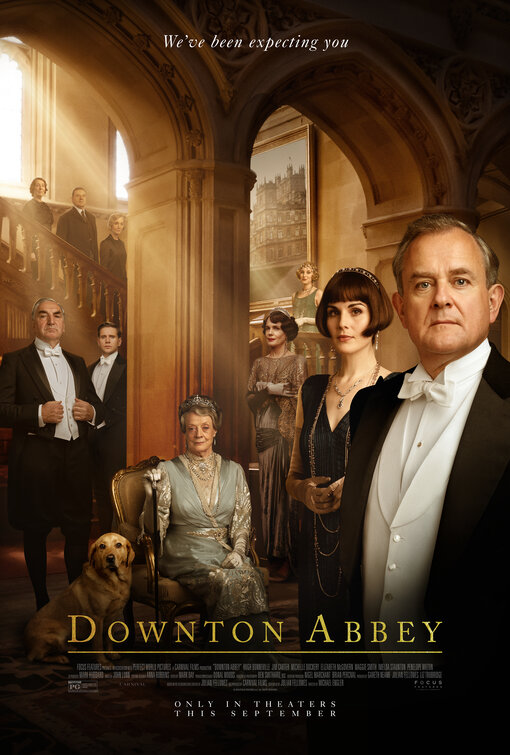
Director: Micheal Engler
Cast: Michelle Dockery, Elizabeth McGovern, Maggie Smith, Imelda Staunton, Tuppence Middleton, Hugh Bonneville, Matthew Goode, Allen Leech, Penelope Wilton, Robert James-Collier, Laura Carmichael, Joanne Froggatt, Kate Phillips, Phyllis Logan, Brendan Coyle, Geraldine James, Jim Carter, Max Brown, Stephen Campbell Moore, Michael Fox, Harry Hadden-Paton, James Cartwright
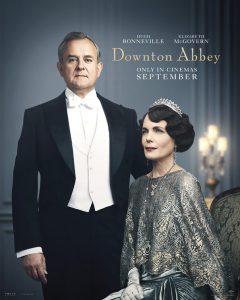
Lovers of the hit BBC TV series Downton Abbey can now watch all their favourite characters on the big screen, with the highly anticipated film version called Downton Abbey which has just been released. The story follows the wealthy Crawley family in 1927 when they are asked to entertain royalty. King George V and his wife Queen Mary are coming to visit the Yorkshire area and the royal retinue will spend one evening at Downton Abbey much to the consternation of the fiercely loyal staff of Downton Abbey led by Mr Carson and Mrs Hughes.
Expertly scripted by Oscar winner Julian Fellowes (Gosford Park), Downton Abbey is a royal treat with sumptuous costumes by Anna Robbins and gorgeous production design by Donal Woods.
The best lines in the film are given to Oscar winner Maggie Smith (California Suite, The Prime of Miss Jean Brodie) who plays the formidable matriarch Lady Violet Crawley who exchanges numerous barbed comments with a mysterious cousin Maud Bagshaw played by Oscar nominee Imelda Staunton (Vera Drake) who has an unnatural attachment to her lady maid Lucy Smith played by Tuppence Middleton (The Current War).
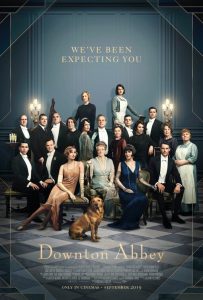
As the Crawley’s entertain the royal couple, there is much intrigue afoot provided by the disgraced butler Barrow played by Robert James-Collier who discovers a secret world to experience his hidden sexuality while the dashing chauffeur turned son-in-law Tom Branson played by Allen Leech (Bohemian Rhapsody) discovers a covert plot to assassinate the king.
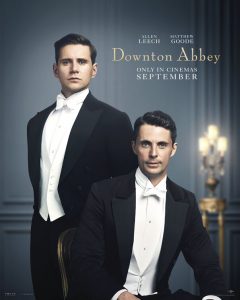
Lady Edith played by Laura Carmichael has some exciting news for her husband Bertie Hexham played by Harry Haddon-Paton while the cook’s assistant Daisy Mason played by Sophie McShera (Cinderella) flirts with the hunky plumber Tony Sellick played by James Cartwright much to the consternation of her beau the ambitious footman Andy Parker played by Michael Fox (Dunkirk).
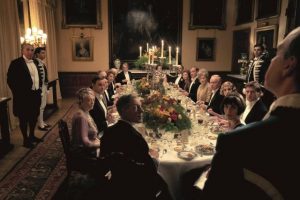
Whilst the upper classes are dining and having balls, there is a downstairs revolt led by Mr Carson played by Jim Carter and Mrs Hughes played by Phyllis Logan who plot to get rid of the royal servants so that they get an opportunity to serve the royal family at an evening banquet held at Downton Abbey with a rather surprising result.
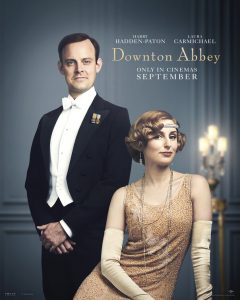
Downton Abbey is ravishingly filmed with a witty script by Fellowes who injects a suitable balance of humour and poignancy into the narrative to make this British period drama both entertaining, thoroughly enjoyable and absolutely thought provoking.
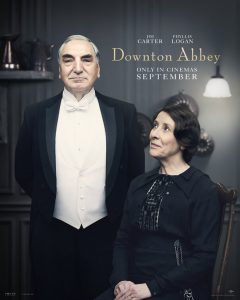
With an existing fan based already created by the hugely popular BBC series, Downton Abbey is a film not to be missed and it’s no wonder it become a Box Office sensation in both America and England on its opening weekend in September 2019. Highly recommended viewing for those that cherish elegant British period films in the vein of The Remains of the Day, Brideshead Revisited and Howard’s End.
Downton Abbey gets a film rating of 9 out of 10 is strictly for fans of the series and beautifully written and acted by a truly noble ensemble cast.
Our Own Private World
The Guernsey Literary &
Potato Peel Pie Society
Director: Mike Newell
Cast: Lily James, Glen Powell, Matthew Goode, Tom Courtenay, Michiel Huisman, Penelope Wilton, Jessica Brown Findlay, Nicolo Pasetti
The Guernsey Literary and Potato Peel Pie Society has to be one of the longest names for a film ever. Yet despite its convoluted title is a richly rewarding film directed by Mike Newell (Four Weddings and a Funeral).
At the centre of this extraordinary tale set during and immediately after World War II in London and in Guernsey is a remarkable performance by British star Lily James as writer Juliet Ashton who discovers that the population of Guernsey have so immensely courageous World War stories to tell during the German occupation of this island.
In fact, not only did they survive the war, the close knit community even formed a literary and potato peel pie society – a private world whereby a small group of book lovers could discuss English literature from Shakespeare to the Bronte sisters over an extraordinary dish a potato peel pie, made without butter or cream.
In the midst of the private literary society is a mystery which Juliet Ashton uncovers about one of Guernsey’s more infamous residents Elizabeth McKenna wonderfully played with daring bravado by Downton Abbey’s Jessica Brown Findlay (Victor Frankenstein).
Members of this private literary society include the dashing pig farmer Dawsey Adams played by Dutch heartthrob Michiel Huisman from Game of Thrones fame, Amelia Maugery played by Penelope Wilton (The Best Exotic Marigold Hotel) and Eben Ramsey played by Oscar nominee Tom Courtenay (The Golden Compass, Nicholas Nickleby, Doctor Zhivago, The Dresser).
Juliet’s extravagant and confident American boyfriend is played by Glen Powell (Hidden Figures, Expendables 3), by what really makes The Guernsey Literary and Potato Peel Pie Society so fascinating is the layered historical story it tells about the inhabitants of the Channel Islands during the German Occupation.
Without giving the story away, this is a richly rewarding British war film held together by a strong classically trained cast, superbly directed by Mike Newell.
The Guernsey Literary and Potato Peel Pie Society gets a film rating of 8 out of 10 and is highly recommended viewing for lovers of uniquely British historical war films.
Nazi Neo-Noir
Allied
Director: Robert Zemeckis
Cast: Brad Pitt, Marion Cotillard, Jared Harris, August Diehl, Lizzy Caplan, Marion Bailey, Matthew Goode, Simon McBurney, Josh Dylan
Flight director Robert Zemeckis’s hopes to rekindle the World War II genre with the Nazi thriller Allied pairing Oscar nominee Brad Pitt (Twelve Monkeys, The Curious Case of Benjamin Button) and Oscar winner Marion Cotillard (La Vie en Rose) are severely dashed.
Whilst Cotillard holds her own as femme fatale Marianne Beausejour speaking French in the stunning Moroccan opening sequence, it is Brad Pitt who looks forlorn as the flaky Canadian spy Max Vatan as he parachutes into the Sahara desert to enter an intriguing plot in Casablanca to assassinate the Nazi German ambassador to the Vichy occupied French Morocco.
The most engaging sequences in Allied is the first act, all set in exotic Morocco, but if the film is aiming to recapture the allure of Anthony Minghella’s Oscar winning masterpiece The English Patient, it falls short of the mark. Despite a competent script by Steven Knight although not his best work (Eastern Promises, Locke), Allied fails to deliver as a riveting war drama mainly due to the surprising lack of screen chemistry between Pitt and Cotillard.
Unlike in director David Ayer’s blood-soaked Fury, Brad Pitt wasn’t on his best acting form, pre-empting the drama of the Brangelina breakup which overshadowed the post-production publicity of Allied to such an extent that Marion Cotillard had to issue a press statement denying that she was the cause of the split between Pitt and Angelina Jolie.
Publicity aside, the second half of Allied set in rain-drenched London during the Blitz is far more dreary than its spectacular opening sequence despite a strong group of British supporting actors including Jared Harris (Sherlock Holmes: A Game of Shadows), Matthew Goode (Brideshead Revisited, Stoker), Marion Bailey (Mr Turner) and Simon McBurney (Mission Impossible: Rogue Nation, The Last King of Scotland).
Audiences should look out for two superb cameos by German actor August Diehl as the Nazi commander Hobar who incidentally also acted with Pitt in Tarantino’s revisionist war drama Inglourious Basterds and Lizzy Caplan (The Interview) as Max’s bohemian sister Bridget.
As Max Vatan and the mysterious Marianne Beausejour marry and set up home in Hampstead during the war, there are rumours circulating that Beausejour is a double agent, secretly working for the Nazi’s and that the entire Casablanca affair was a ruse to get Vatan to trust her. As Marianne states in the opening scenes, “I keep my emotions real. That’s why it works” which beguiles Max into falling in love with the sophisticated yet steely eyed Frenchwoman.
Whilst Allied is an engaging film in the first half, with stylish 1940’s costume to match, the second half fails to keep the audience interested and develops into a slightly soppy second half as the truth emerges.
Allied is an average war drama from a screenwriter that could have delivered far better and from two stars that required a more dynamic plot to compensate for their dismal lack of onscreen chemistry.
29 Million Variations
The Imitation Game
Director: Morten Tyldum
Cast: Benedict Cumberbatch, Keira Knightley, Matthew Goode, Charles Dance, Rory Kinnear, Alan Leech, Tom Goodman-Hill, Matthew Beard, James Northcote, Steven Waddington
Based upon the 1983 book by Andrew Hodges, Alan Turing: The Enigma and brilliantly adapted into an insightful screenplay by Graham Moore, The Imitation Game is a superb and evocative historical drama about the breaking of the enigma code at Bletchley Park during World War II.
Norwegian director Morten Tyldum elegantly weaves a very touching and tragic story of espionage, cryptography and sexuality extracting nuanced performances out of Benedict Cumberbatch as Turing and Keira Knightley as Joan Clarke, an odd couple who make up the mysterious collective which work on and break the seemingly impossible Nazi enigma code at the height of World War II. Using real war footage and blending in a fascinating portrayal of the mathematician Alan Turing whose genius has only recently been acknowledged.
Set between the years of 1928 and 1951, The Imitation Game paints a moving portrait of a very complicated man, whose brilliance was only threatened by the inherent violence of war which engulfed England during the 1940’s as well as the prejudice which followed regarding his latent homosexuality in the early 1950’s.
Cambridge mathematician graduate whose thesis was entitled the Imitation Game, Alan Turing was socially awkward, shy, bullied at an English prep school but the perfect sort of individual who had the foresight and intelligence to develop a machine which cracked the seemingly unbreakable enigma code, a daily Nazi signal which gave countless GPS co-ordinates of where they would be bombing next during World War II with a minimum of 29 million variations.
Naturally groomed by the newly formed MI6 by Stewart Menzies wonderfully played by Mark Strong, Turing is recognized for his potential and yet later vilified for his own sexuality in a moving portrait of one the 20th century’s biggest injustices, his charge and subsequent punishment of chemical castration for being homosexual in 1952, when it was still criminalized in Great Britain.
This was despite the fact that Turing’s mathematical brilliance was the reason that the complicated machine which he called Christopher named after a schoolboy crush, manages to decipher this seemingly unbreakable code able to break the Nazi code and prevent World War II from continuing beyond 1945.
Historically there were lots of other reasons the War ended when it did, but The Imitation Game focuses on the people behind the scenes, the cryptanalysts and code-breaking who elusively assisted those fighting on the front line.
Widely regarded as the founding father of theoretical computer science Alan Turing’s life story http://en.wikipedia.org/wiki/Alan_Turing has only recently gained prominence following a Royal pardon and a highly publicized internet campaign to clear Turing’s name and bestow upon him the recognition he never received in his own lifetime.
With a suitably moving musical score by Alexandre Desplat, The Imitation Game is a poignant and superb historical drama of Turing and his band of men and one woman, Joan Clarke, featuring one of the best performances by Knightley (Atonement, Anna Karenina) in a race against time to save the world from tyranny. Turing’s genius as a mathematician came at a price, his apparent lack of emotional empathy yet despite the enormity of his task, he remained ironically detached from the brutal war which engulfed Europe and the world around him.
The Imitation Game is an intelligent historical drama, with universal themes of injustice and perseverance despite the prejudice and the odds against infuriating bureaucracy and time itself. Highly recommended for those viewers that enjoyed Atonement and Another Country.
2014 Toronto Film Festival
2014 Toronto International Film Festival Winners
Toronto International Film Festival (TIFF) takes place every year in September in Toronto, Canada.
Films which premiere at Toronto are often nominated for Academy Awards the following year.
TIFF does not hand out individual prizes for Best Actor or Actress but focuses on amongst others the following awards:
People’s Choice Award & Best Canadian Feature Film
Opening Night Film: The Judge directed by David Dobkin starring Robert Downey Jr, Robert Duvall, Dax Shepard, Billy Bob Thornton, Vera Farmiga, Vincent D’Onofrio
People’s Choice Award: The Imitation Game directed by Morten Tyldum starring Benedict Cumberbatch, Keira Knightley, Matthew Goode, Mark Strong, Charles Dance, Tom Goodman-Hill
Best Canadian Feature Film: Bang Bang Baby directed by Jeffrey St. Jules starring Jane Levy, Peter Stormare and Justin Chatwin.
(No Image available)
The Zong Massacre
Belle
Director: Amma Asante
Cast: Gugu Mbatha-Raw, Tom Wilkinson, Penelope Wilton, Miranda Richardson, Emily Watson, Tom Felton, Sam Reid, Matthew Goode, Sarah Gadon, James Norton
South African British actress Gugu Mbatha-Raw stars as Dido Elizabeth Belle, a mixed race woman who has the fortune to be rescued by her father and installed at the Hampstead home of his Uncle William Murray, the 1st Earl of Mansfield, who also happens to be the Lord Chief Justice for the infamous Zong trial which featured prominently in British society at the end of the 18th century.
The Zong Massacre – http://en.wikipedia.org/wiki/Zong_massacre revolved around a British slave ship which jettisoned half its cargo including a great many slaves in the West Indies, drowning them in the Caribbean Sea because there was not enough drinking water on board the slave ship while heading from modern day Ghana to Jamaica.
The Liverpool merchant owners of the slave ship sought insurance compensation for lost cargo which caused a public trial and an outcry back in England as it highlighted the horrors of the 18th century slave trade, naturally bringing up the age old question of can there ever be a price put on a human life. The history of the Zong trial and the massacre of the slaves on board takes centre stage in director Amma Asante’s riveting and slightly contrived social-historical drama Belle.
Like Amazing Grace, Belle centres on the last decades of the British slave trade and portrays a society on the brink of change. Set in England in the 18th century under the reign of King George III (the mad one!), Dido Elizabeth Belle – http://en.wikipedia.org/wiki/Dido_Elizabeth_Belle tells the story of Dido Belle a mixed race heiress and under the guardianship of Lord Mansfield must navigate her way despite her title and wealth through the apparent prejudices of 18th century British society.
 Painting by Johann Zoffany, 1779
Painting by Johann Zoffany, 1779
Accompanied by her first cousin Elizabeth Murray, played by Canadian actress Sarah Gadon (Cosmopolis, A Dangerous Method), who was without a dowry, Belle and Elizabeth need to secure suitable husbands, both of which apparently come in the form of the Ashford brothers James and Oliver played by British actors James Norton (Rush) and Tom Felton of the Harry Potter franchise.
However Belle or Dido as she is referred to in the film has her sights set on an ambitious abolitionist lawyer John Davinier, played by Australian actor Sam Reid (Anonymous) who is assisting the 1st Earl of Mansfield in the legal case regarding the Zong Question as it was politely known in 1783.
Ably assisted by a consummate script written by Misan Sagay, Belle is an absorbing and intelligent social-historical drama, similar to the Michael Apted film Amazing Grace with less of the apparent cruelty of Steve McQueen’s Oscar winning film 12 Years a Slave.
Belle, along with a nuanced performance by Gugu Mbatha-Raw features a superb supporting cast including Emily Watson (The Book Thief), Penelope Wilton (The Best Exotic Marigold Hotel & Downton Abbey series) and the brilliant Tom Wilkinson (Michael Clayton) as the Earl of Mansfield who takes Belle under his guardianship at Kenwood House, Hampstead.
This is a fascinating portrait of England at the end of the 18th century, whereby race and politics as well as class and legitimacy ruled a conservative society constricted further by prejudice and ruled by desire for European commercial superiority, which despite its horrors was the main reason that the slave trade come into existence and historically changed the West African, European and Caribbean demographics. For lovers of historical drama with a social conscience, Belle is recommended viewing and an exceptionally interesting film.
Madhatters to A Single Man…
Alice in Wonderland
Tim Burton’s Alice in Wonderlandis clever, unconventional, but essentially not darker enough – although saved by Tweedledum & Tweedledee and the Red Queen… Johnny Depp is wonderful as the Madhatter and Helena Bonham Carter is brilliant as the Red Queen. Anne Hathaway also features as the White Queen along with Mia Wasikowska as Alice Kingsleigh in the titular role.
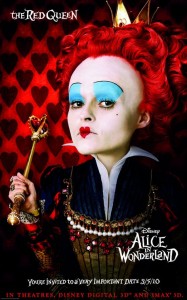
Ruling Wonderland one Queen at a time!
Remember Me
Remember Me is surprisingly good although does tend to drag in the 2nd act, but wait for the finale – its a stunner… And as for Robert Pattinson – of course he is brilliant and holds his own in the film amongst such support talents as Pierce Brosnan, Academy Award winner, Chris Cooper (Adaptation) along with Oscar nominee and Swedish born actress Lena Olin (Unbearable Lightness of Being, Enemies: A Love Story). Recommended viewing.
A Single Man
Tom Ford’s luscious and sexy A Single Man is pure cinematic pleasure, every shot is like a Vogue fashion shoot and whilst the supporting cast are to die for, its really Colin Firth’s wonderful and sensitive central performance that lingers long after the lavish final shot!! See it just for the Spaniard in the Phone Booth scene!! Utterly breathtaking… especially Nicholas Hoult as the young and gorgeous Kenny skinny dipping in the Pacific at Midnight. Also starring Matthew Goode and Ginnifer Goodwin.
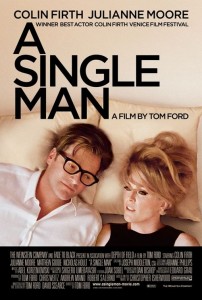
Lover and the Lush!
*********
Decline of the English Aristocracy.
Brideshead Revisited
The period between the World Wars in the Twentieth century has always been a fascinating time in Western History. The 1920’s and 1930’s saw a huge resurgence in creative energy in Europe, notably the Bohemian decadence of Parisian artistic circles and the radical Modernist aspirations of the Bloomsbury Group. Those two decades with all its turbulent European events marked the eventual decline of the Victorian formalities that restricted the 19th century, something that Oscar Wilde predicted would eventually falter.
Brideshead Revisited is a sumptuous big screen adaptation of Evelyn Waugh’s complex examination of the erosion of the ideals that held the English aristocracy in so much high regard, from their religious and moral superiority to the many temptations that members of that class succumbed to, from adultery, to forbidden sexuality and substance abuse, to the many foreign attractions of marrying outside that closed world in order to insure their own survival. Remnants of that particular aristocracy have obviously evolved fifty years on and still dwell in secluded regions of England and Europe.
However it was really during the 1930’s with the devastating effects of the 1929 Wall Street Crash and the ensuing economic depression that engulfed much of the Western World and the inevitable outbreak of World War II that marked the demise of the seemingly immovable landed gentry in Europe. Sound Familiar? Fortunately we don’t have any World Wars looming in this century, but the future can never entirely be predictable.

The wealth is in the title…
Historical observations aside, Brideshead Revisited is a complex and brilliant film, directed with a fluid and delicate eye for detail by Julian Jarrolds who rose to fame with Becoming Jane about the life of Jane Austen and Waugh’s novel, a magnum opus which is superbly crafted into an epic narrative by Jeremy Brook, screenwriter for such classic films as Mrs Brown and The Last King of Scotland, no easy accomplishment considering that in the 1980’s Brideshead Revisited was an extremely successful BBC mini-series mainly because of the scope of Waugh’s detailed analysis of the decline of British Aristocracy between the Wars.
With BBC backing and between director Jarrolds, and the success of Jeremy Brook as a screenwriter, I was assured that this epic masterpiece would be given all the respect it deserves. Brideshead Revisited is like a tour-de-force of some of the best films on similar themes from the beautiful Merchant Ivory film, The Remains of the Day to the more recent critically acclaimed Atonement and of course the spectacular Wings of the Dove, all these films based on acclaimed novels by Kazuo Ishiguro, Ian McEwan and Henry James respectively.
What sets Brideshead Revisited apart from these comparable screen masterpieces, is its particular emphasis on the religious aspect of this aristocratic families decline, their staunch attachment to Catholic principles despite a life rather decadently lived. For as long as the characters receive absolution for their sins before death, then their place in the afterlife was secured, as we are so rightly told by Brideshead Matriarch, Lady Marchmain a brilliant performance by Emma Thompson.
From the gay and carefree days of Oxford in the late 1920’s to sumptuous Venetian palazzo’s complete with a cameo by White Mischief star Greta Scacchi, the camp and flamboyantly destructive Lord Sebastian Flyte, played by Ben Whishaw lives a self-indulgent and decadent existence, luring an unsuspecting artist Charles Ryder into this unscrupulous and almost fiercely protected yet infinitely opulent world.
Ryder played with subtle dexterity by Match point star Matthew Goode is soon embroiled in the intrigues of an aristocratic family whose powerful religious convictions are as strong as their indulgences and desires are deceptive. As the characters develop and destroy each other aspirations, it really is the property of Brideshead itself, which takes centre stage, an imposing stately mansion filled with Roman Catholic art, fountains and sculptured gardens.
Like the palatial homes seen in The Remains of the Day, A Handful of Dust and now in Brideshead Revisited, it was ultimately the ownership of such lavish estates that fell into jeopardy and were often auctioned off or decommissioned for military purposes once the full effects of World War II had embraced Europe, changing and scattering that aristocracy forever, since without property ownership, all claims of wealth are an illusion.
Brideshead Revisited is a sumptuous cinematic feast, the kind of epic film that has seemingly long gone out of fashion to be replaced with the slick computerized world of American paranoia that Hollywood so duly produces. Of course it is essentially British, and any viewer who has a deep appreciation of literary films and especially of historical epochs will surely be grateful to see such attention given from the gorgeous costumes to the magnificent scenery from Venice to Marrakech lavished on a well-deserved and extremely pertinent period film about the fluid and almost traceable decline of a world long gone. With intelligent insights into such complex themes as religious superiority, addiction and forbidden desires, it is obvious that the strengths of Brideshead Revisited will be recognizable in the 21st century while such issues still remain as relevant in today’s society, as they were seventy years ago.
Don’t miss such a superb classic as Brideshead Revisited, as the story demonstrates that no matter how powerful a society is, that power can quickly be eroded by historical events and economic insecurities, not to mention all the accompanying desires that so often plague the human race.











